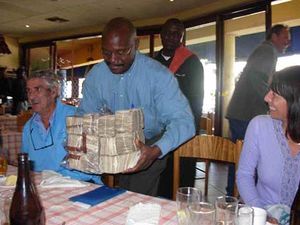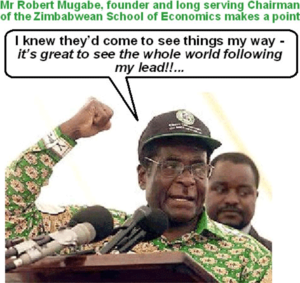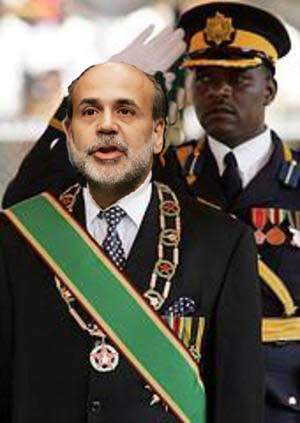User:NaturalBornKieler/Lab2
The Zimbabwe School of Economics (also known as the “Harare School” or the “Paper Value School”) is a heterodox school of economics that emphasizes the spontaneous price organizing power of the printing press, holds that the complexity of subjective human choices makes any sort of common sense obsolete and therefore advocates a helicopter approach to the economy. Zimbabwe School economists advocate the increase of the money supply in any case of boom, prosperity, stagnation, recession, panic, boredom, or stock index decline.
History[edit | edit source]
Classical economics focused on the preconception that money is in some mysterious way connected to value and therefore the money supply should be restricted in some way to roughly represent the value of available goods and services. This concept, however, turned out in time to be too primitive for complex economies. There is more to the complex market economies of the late 20th century than just providers and consumers of goods and services. To be precise, while all participants of a modern economy are willing to consume goods and services, only a certain fraction of them are willing and able to supply them. More and more individuals are joining the group of effortless consumers, for example politicians, bankers, heirs, hobos, or other criminals. And an even larger fraction of the general public wish to spend more money than they actually earn.
This imbalance required a new approach in monetary theory. New sources of money had to be opened up. Certain economy doctrines suggested debt as a solution for the problem. This idea was successfully implemented for a while until a flaw in this approach was found: Some creditors entertained the exotic idea that a debt should be paid back at some point in time. Economic experts began to ponder and realized that if this idea took root there would be a limit to the debt money supply at a certain time in the future. New solutions had to be found.
Next, another monetary theory surfaced with a new solution for additional money supply: fraud. By selling derivatives, securities and other fantasy paper products created out of thin air, pumped and dumped by banks and corrupt rating agencies, a new source for virtually unlimited amounts of money could be created. This strategy was a tremendous success for a decade, but eventually reached its own limits when finding new hapless victims grew more and more difficult. When even the remotest Tibetan village was ploughed through by investment bankers several times over, support for this economic strategy began to dwindle.
At this point, the Zimbabwe School of Economics stepped in. This economic principle (named after Zimbabwe since the country represents a model case) holds that monetary liquidity is the key to a prosperous economy. Instead worrying about production, or borrowing, or making up financial instruments out of thin air, the Zimbabwe School focuses on the core of the problem and suggests to create money itself out of thin air. The basic idea behind this theory is an empirical calculation which showed that the supply of thin air will not be exhausted for several millennia.
Main objectives and teachings[edit | edit source]
- Familiarise the public with big numbers.


